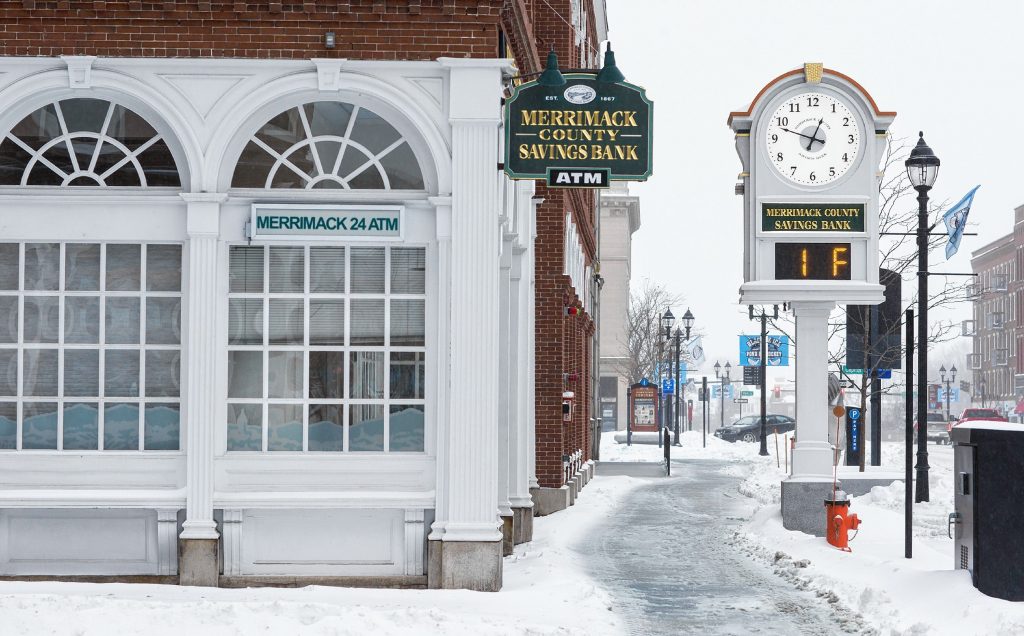It seems to be a common sight in downtown: a store or a food spot goes away and is later replaced by a banking institution.
Take the former site of the Crazy Goat, bought by Bangor Savings Bank in August. While conceptual plans leave room for some sort of restaurant, the split-level building’s facade will be dominated by a banking sign.
Then there was the Pompanoosuc Mills furniture store at 11 N. Main Street. They moved down the street and have since been replaced by a Bank of New Hampshire wealth management location.
Ledyard National Bank was eyeing the location of The Wellness Corner Natural Pharmacy on South Main Street, but withdrew its proposal from the zoning board in early January, city documents show. For now, the site is still owned by Natural Pharmacy owner Marty Donovan.
There are 20 banks and savings institution offices in Concord, and nine of them are on Main Street, according to the Federal Deposit Insurance Corporation (FDIC). At least half a dozen are in downtown proper, not including the various credit unions.
This isn’t a trend unique to Concord; the state’s banking commissioner, Jerry Little, said he’s been fielding calls on why so many banks have set up shop in New Hampshire for about six months now, when New Hampshire Business Review dove into the issue.
Essentially, banks have been taking an interest in New Hampshire because the economy is viewed as healthy, Little said.
“Compared to the other areas around us, it’s much more apparent that there’s business activity going on here,” he said. “The institutions are going where they can make money.”
That’s for sure – according to the FDIC, $2.5 million in deposits have been made at Concord’s banks since June 30, 2018.
So that’s good news for the state. But it does make you wonder if it’s what the city envisioned for its downtown.
The Central Business Performance (CBP) District, downtown’s primary zoning, was established to “encompass the traditional downtowns of Concord and Penacook” and to attract a variety of uses, like retail, restaurant, service, entertainment, cultural, lodging, office, governmental, high density residential and mixed-use developments, according to the city’s zoning rules.
We all know the city invested a lot of money to try to make that happen through the Main Street renovation project.
That gives any business good incentive to try and get a storefront in downtown, said Great Concord Chamber of Commerce President Tim Sink. But a balance is necessary to keep Concord a destination.
“If we’re a wise community, we’ll maintain a good balance of what makes a downtown interesting,” he said. “That’s critical because if we don’t do that, we’ll shoot ourselves in the foot.”
And banks don’t exactly bring liveliness to downtown, said developer Mark Ciborowski.
“The banks and financial wellness institutions are great business, run by community-minded people, who want to be in downtown for the right reason,” he said. “But in the long run, having a lot of them hurts the downtown. It’s not the direction we want to be going in.”
It’s a matter of optics, Ciborowski said – if a vibrant nightlife is marked by brightly-lit storefronts and bars, then financial institutions become “black holes” when they shut down in the evening and on the weekends.
Ciborowski said he’s choosey with his tenants for that reason; if a business won’t add to the quality of the downtown, he won’t rent to them.
But it’s easy for him to say that; Ciborowski’s family owns 14 buildings in downtown, and he freely admits that sitting on an empty space for him, while still tough, might not be as hard as it is for other landlords.
And in a time when retail is struggling in the face of online shopping, financial institutions can afford to pay downtown’s rent. A spot on Main Street can run around $17 per square foot a month for a 1,400 square foot space; a 794 square foot space in the Capital Commons costs $23 per square foot, according to the New England Property Exchange.
But downtown’s not banked-out, said deputy city manager of development Carlos Baia.
“I think if people still want to go to downtown, they’re still shopping in shops, and banking in banks, that frames a picture of a successful downtown,” he said.
And Mayor Jim Bouley said banks contribute to the city’s well-being in ways that might not be readily apparent.
Take the new Concord Theatre; that project was able to get off the ground in part due to a hefty contribution from the Bank of the New Hampshire. To honor their help, the theater’s main stage will be named after the business, memorializing their contribution for years to come.
“They’re good corporate citizens,” he said. “They do a lot of good.”
(Caitlin Andrews can be reached at 369-3309 or candrews@cmonitor.com.)









